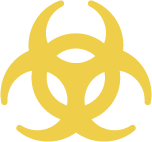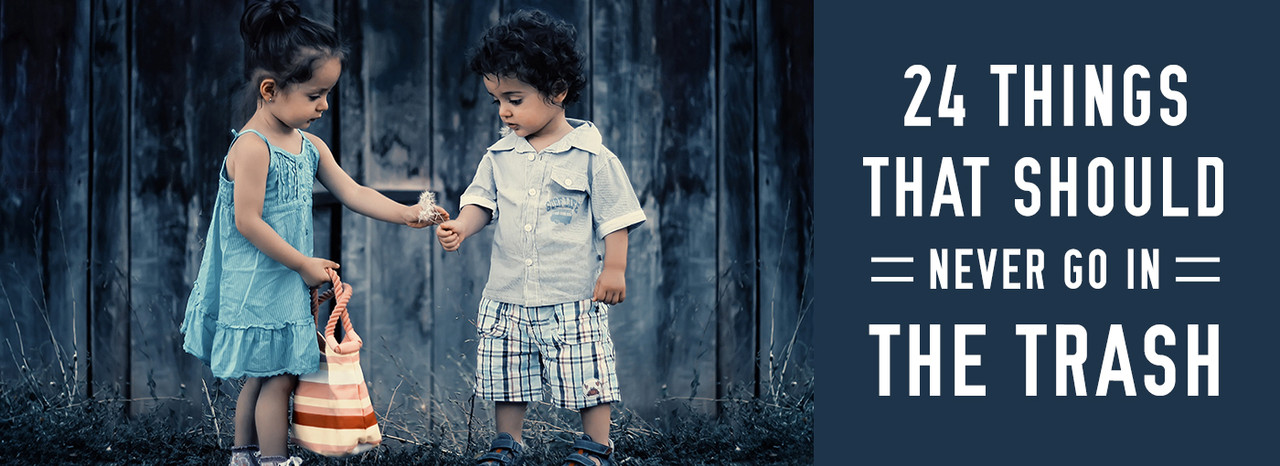When household items are broken, expired, old, or simply going unused, many of us simply reach for the nearest trash can. But the average household has nine categories of hazardous waste sitting idly throughout the home. Hazardous waste is dangerous to throw away, and a major hazard to our environment. How do you know what’s hazardous and what’s not?
We’ve put together a list of 24 household items that should never go in the trash. The next time you go to throw away an old item, reference this list so you’re aware of what’s trash, what’s recycling, and what needs special arrangements to be disposed of.
What You Shouldn’t Throw In The Trash
Chemicals
Strong household cleaners like bleach, pesticides, solvents and corrosive chemicals should never go in the trash. Chemicals should always be treated with extreme care because of their potentially harmful impacts to the land, water and humans they come into contact with.
Luckily, there are several safe alternatives that allow you to get rid of your unwanted chemicals. If you're not going to use them up, take them to a household hazardous waste facility for safe disposal. Search for a hazardous waste drop-off facility in your area at Earth911.com.

Batteries
Although small, batteries like AAA, AA, C, D, button cell, 9-volt, and others, contain large amounts of cadmium, mercury, and lead. Tossing your batteries in the trash sends them to an incinerator or landfill where their casing can disintegrate, releasing their chemicals, sometimes in large amounts.
Though they seem small, batteries pose a large environmental hazard. Recycling them is the best way to keep these harmful chemicals from the Earth.Many of the chemicals found in batteries can be reused and put back to work in new batteries. Earth911.comis also great for locating facilities to recycle your batteries.

Car Batteries
Like small batteries, lead-acid car batteries, as well as lithium batteries, should not go in the trash either because of their contained chemicals. The saving grace with car batteries is that roughly 97 percent of the lead in a 12-Volt battery can be recycled. Even their plastic casing can be ground up and reused.
Take your old car batteries to a local recycler, such as an auto shop or a car battery supplier, and they’ll recycle them for you for free. It’s so easy and common that today 99% of all car batteries in the US are recycled.

Televisions
Old tube, LED, LCD, OLED televisions should not be put in trash cans or dumpsters either. Televisions contain toxic chemicals like lead, mercury, nickel, cadmium, and more. These chemicals are detrimental to human and environmental health, and they need to be dealt with safely. It’s easy to chuck the old broken screen in a dumpster, but you’ll do the earth a favor if you take it it to a recycling center or a (participating) electronics store.

Computers & Monitors
Most computers and monitors are considered hazardous waste. They’re chock full of toxic chemicals like arsenic, lead and cadmium. Also consider that throwing away your computer, with your hard drive in tact could put your personal information at risk. Once you throw it away, there is no telling who can get their hands on your hardware and your data. Recycle your computers and monitors at a local recycling center or at participating electronics stores.

Cell Phones & Other Electronic devices
Cell phones, printers, VCRs, telephones, and radios don’t belong in a landfill. Most cell phones and other electronics contain precious metals and plastics that can be recycled to save energy and resources that would otherwise be required to mine or manufacture these materials. When placed in a landfill, these materials pollute the air, contaminate soil, damage animal and plant life and can impact our food supply and drinking water. There are more than 10 places to recycle these electronic devices - Including kiosks, donation bins, electronics store chains, and non-profits.

Microwaves
Although microwaves aren’t considered e-waste, parts of old microwaves can still be hazardous because they use a capacitor that contains a residual electrical charge. Taking old or broken microwaves to scrap metal or recycling companies can lessen their impact on the environment. Many local trash disposal companies recycle microwaves, which may be your easiest solution. Calls yours to find out. If they don’t, Earth911 is always a great resource.

Refrigerators
Refrigerators should not be thrown in a dumpster because of the refrigerant they contain. Refrigerator disposal is usually provided by local sanitation departments as part of the “bulky debris” or “bulky waste” pickup schedule.

Hazardous Materials
You should never throw commonly known hazardous materials like asbestos, pesticides, contaminated soils or absorbents in the trash. These materials are dangerous when exposed to the soil or water. Take extreme care when disposing of these hazardous materials.
Asbestos should be double wrapped in a strong plastic bag and disposed of at a waste treatment center. Take your unwanted pesticides to your local household hazardous waste or call 1-800-CLEANUP.
Prior to disposal of any chemical waste, soils or absorbents, ahazardous waste determination must be made. You can request a waste pickup but the waste must be labeled “EH&S waste” and the hazard ID on the label must be marked.

Medical Needles & Sharps
Medical waste, as well as needles and sharps, should never be thrown away in a normal trash. They can contain bacteria and diseases that shouldn’t have a chance to come in contact with anyone after disposal. Medical waste should be put in special containers like a “sharps disposal container.”

Unused or Expired Prescription Drugs
Prescription drugs should not be thrown away because their chemicals can leach into the soil and water supply, where they can wreak havoc with the environment. Instead, search takebackyourmeds.org for a drug take-back event in your area. If you’re unable to locate a take-back in your area, follow the FDA’s tips for safely disposing of your medications.

Paint and solvents
There is a large amount of oil and chemicals in most paints - that’s the main reason you shouldn’t throw them away in the dumpster. Paint becomes a problem for the environment when it leaks and contaminates the water supply. Empty paint cans can usually be tossed as well dried paint. If you still have fresh paint, find a way to dry it such as mixing it with cat litter. When it’s dry, you can throw it away.

Ink
Ink used in pens and printers, as well as resins, are toxic. You should never throw them in the garbage. On top of that, they can also damage equipment and stain almost anything that comes in contact with them. Ink is best disposed of through recycling centers or retailers with drop-off locations.

Aerosol & Spray Cans
Aerosol cans that aren’t completely empty contain hazardous materials. Many products in aerosol cans are toxic and many aerosol cans contain flammables, like butane, as propellants for products like paint. Spray cans also contain propellants and chemicals that make them unsafe to throw away. If your aerosol can is labeled with words like “toxic” or “flammable,” don't put it in the trash unless you know it is completely empty.\

Mercury thermometers
If you have an old thermometer or thermostat hanging around the house and see a ball of silver mercury in it, don’t throw it in the trash. The average mercury thermometer contains 500 milligrams of mercury, which can become a health hazard if the thermometer is accidentally broken. Exposure to even small amounts of mercury can cause health damage to humans and wildlife.You will have to utilize your local household hazardous waste (HHW) facility or mercury disposal and recycle events to properly dispose of and recycle these items.

Motor Oil & Other Automotive Fluids
Motor oil and other automotive fluids can contaminate waterways, harming aquatic life and water supply’s. That’s why they should never go into a landfill. Take your old oil and automotive fluids to gas stations that accept used oil for recycling.

Fuels & Gas
Disposing of propane tanks, fuels, oils, and other flammable materials such as compressed gas cylinders in the dumpster is a big safety issue. These substances are highly volatile and combustive. Disposing of them improperly is even illegal in some states and areas. There are a bevy of recycling programs for these fuels, including stations at local grocery stores which will allow you to switch out an empty tank for a full one.
 Tires
Tires
You can’t throw tires away - 48 states have a law against throwing them away, and most landfills in the U.S. will not accept them. One of the biggest reasons is they take up a lot of space and because there are just so many other uses for old tires. Tires can be put to great use when recycled or repurposed. They can be shredded or used for playgrounds, turf or mixed in with asphalt. Most tire stores will recycle your old ones for free or when you purchase a new set. Search for “tire recyclers” on Earth 911 or find a great way to repurpose them yourself.

Smoke Detectors
Smoke detectors shouldn’t be thrown in the trash because they can use electronic parts that contain chemicals and mercury, as we described above. Ionization chamber smoke detectors (ICSDs) also contain a small amount of ionizing radiation in order to detect the presence of smoke. This is radioactive material makes these smoke detectors a potentially hazardous substance. To properly dispose of old smoke alarms, use your local household hazardous waste (HHW) facility or event.

Light Bulbs
Light bulbs, especially fluorescent light bulbs and compact fluorescent light bulbs (CFLs) contain a small amount of mercury (about 5 milligrams). When a light bulb is broken, that mercury is released into the atmosphere. Instead of throwing them away you should recycle them or take them to an HHW facility.

Electrical Switches and Relays
Like Light bulbs and smoke detectors, electrical switches and relays can contain a small about (about 3.5 grams) of mercury. Mercury switches can be found in some freezers, washing machines, sump pumps, electric space heaters, clothes irons, silent light switches and automobile hood and trunk lights. Dispose of these like you would smoke detectors or light bulbs.

Treated Wood
Some treated woods have chemicals to help preserve them against insects, microbes, and decay. These chemicals become hazardous if they get into soil or water supplies. Not all treated wood is considered hazardous waste. The Department of Toxic Substance Control (DTSC) is developing regulations for the handling of treated wood and has developed information on treated wood disposal.

Plastic Bags
Many plastic bags including sandwich and freezer bags should be recycled. These things never decompose. They can also get trapped in wildlife environments and harm fish, birds and other animals. To properly dispose of plastic bags, and all other packaging made of plastic film, search www.plasticfilmrecycling.org to find a convenient drop-off location.

Explosives (e.g. fireworks)
For obvious reasons, you should never throw “duds” or otherwise unexploded fireworks in the trash. Before you throw these out, soak them overnight in water so they are both safe to handle and safe in the dumpster.
Now you “know before you throw” what should and shouldn’t be tossed in the trash can. If you are ever unsure if something should or shouldn’t be thrown away, be sure to check out Earth911 or 1800 Recycling.


